Reflection Paper: Business Communication Course Insights
VerifiedAdded on 2020/03/16
|6
|1381
|33
Journal and Reflective Writing
AI Summary
This reflection paper explores the critical role of communication in business and professional development. The author reflects on a course that emphasized communication skills, highlighting the importance of effective communication strategies for organizational success and the development of future managers. The paper discusses various elements of communication, including sender-recipient feedback, message perception, encoding, and decoding, as well as the impact of both centralized and decentralized communication networks. The author emphasizes the significance of communication in building relationships with stakeholders, managing conflicts, conveying information, and fostering goodwill. Additionally, the paper explores how technological advancements, such as social media, have changed business communication. The author concludes by emphasizing the importance of communication skills for managers, the ability to adapt communication styles to different situations, and the role of effective communication in preventing misunderstandings and ensuring business success. The paper demonstrates the author's enhanced understanding of communication within the business context and its impact on professional growth.
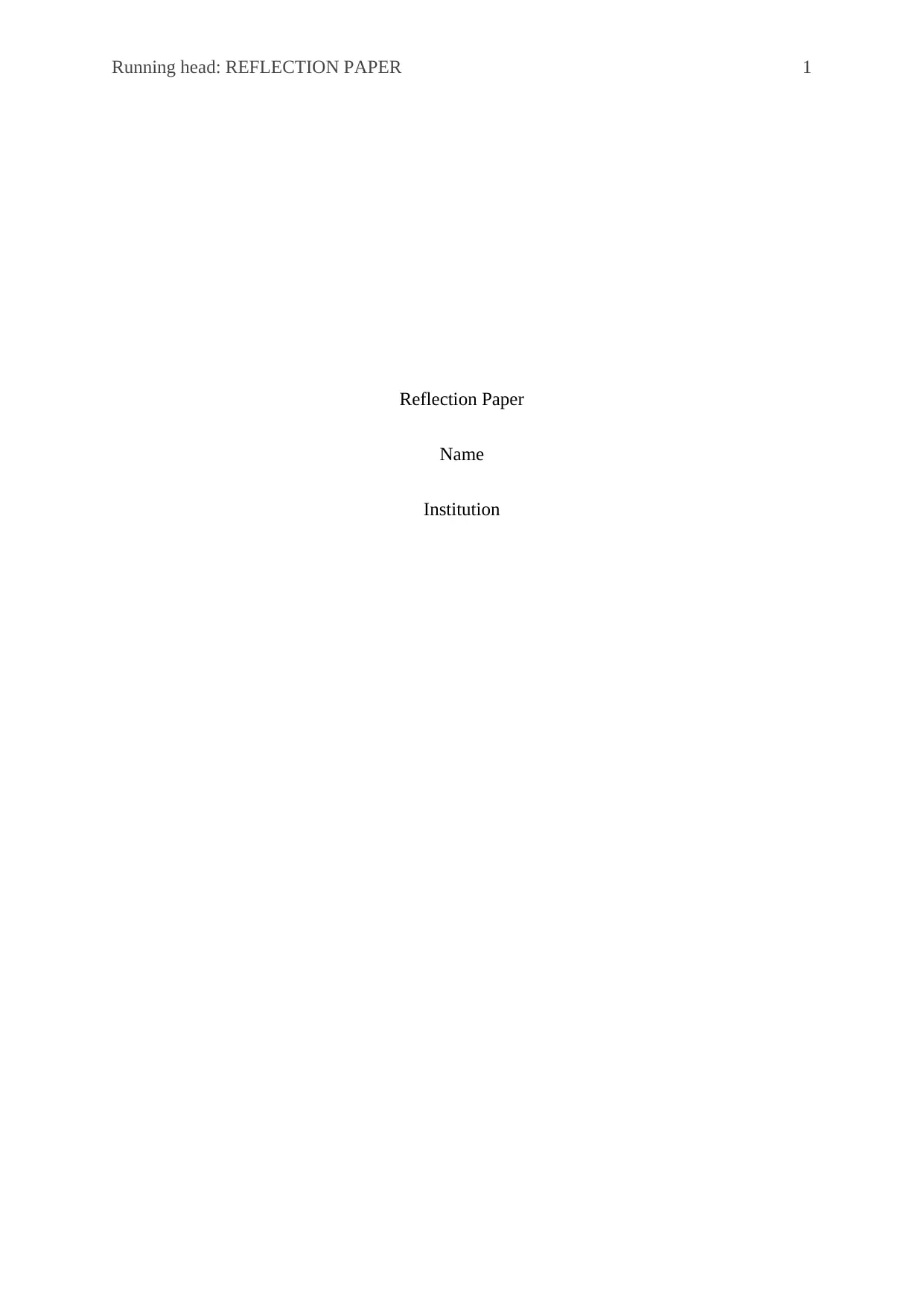
Running head: REFLECTION PAPER 1
Reflection Paper
Name
Institution
Reflection Paper
Name
Institution
Paraphrase This Document
Need a fresh take? Get an instant paraphrase of this document with our AI Paraphraser
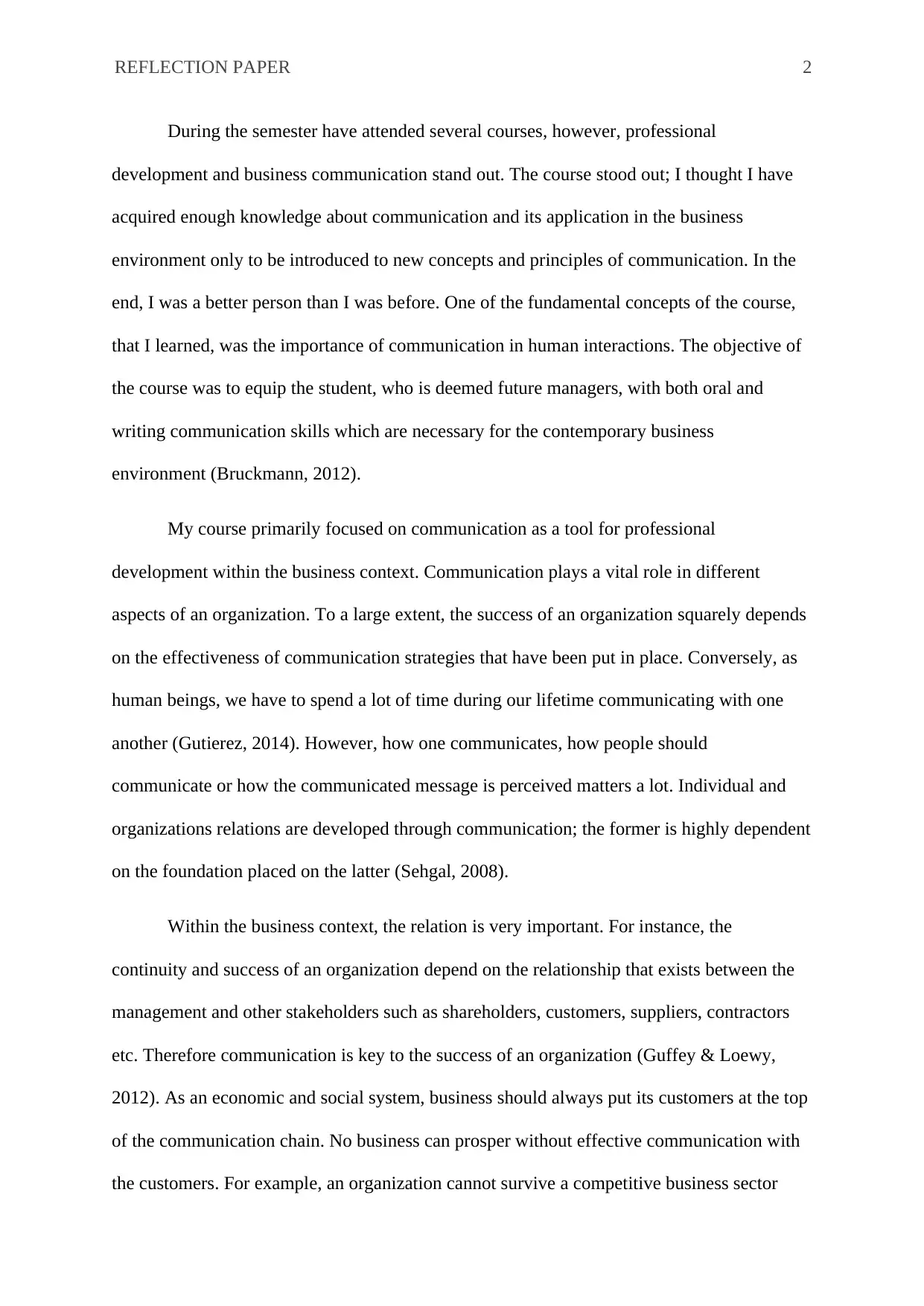
REFLECTION PAPER 2
During the semester have attended several courses, however, professional
development and business communication stand out. The course stood out; I thought I have
acquired enough knowledge about communication and its application in the business
environment only to be introduced to new concepts and principles of communication. In the
end, I was a better person than I was before. One of the fundamental concepts of the course,
that I learned, was the importance of communication in human interactions. The objective of
the course was to equip the student, who is deemed future managers, with both oral and
writing communication skills which are necessary for the contemporary business
environment (Bruckmann, 2012).
My course primarily focused on communication as a tool for professional
development within the business context. Communication plays a vital role in different
aspects of an organization. To a large extent, the success of an organization squarely depends
on the effectiveness of communication strategies that have been put in place. Conversely, as
human beings, we have to spend a lot of time during our lifetime communicating with one
another (Gutierez, 2014). However, how one communicates, how people should
communicate or how the communicated message is perceived matters a lot. Individual and
organizations relations are developed through communication; the former is highly dependent
on the foundation placed on the latter (Sehgal, 2008).
Within the business context, the relation is very important. For instance, the
continuity and success of an organization depend on the relationship that exists between the
management and other stakeholders such as shareholders, customers, suppliers, contractors
etc. Therefore communication is key to the success of an organization (Guffey & Loewy,
2012). As an economic and social system, business should always put its customers at the top
of the communication chain. No business can prosper without effective communication with
the customers. For example, an organization cannot survive a competitive business sector
During the semester have attended several courses, however, professional
development and business communication stand out. The course stood out; I thought I have
acquired enough knowledge about communication and its application in the business
environment only to be introduced to new concepts and principles of communication. In the
end, I was a better person than I was before. One of the fundamental concepts of the course,
that I learned, was the importance of communication in human interactions. The objective of
the course was to equip the student, who is deemed future managers, with both oral and
writing communication skills which are necessary for the contemporary business
environment (Bruckmann, 2012).
My course primarily focused on communication as a tool for professional
development within the business context. Communication plays a vital role in different
aspects of an organization. To a large extent, the success of an organization squarely depends
on the effectiveness of communication strategies that have been put in place. Conversely, as
human beings, we have to spend a lot of time during our lifetime communicating with one
another (Gutierez, 2014). However, how one communicates, how people should
communicate or how the communicated message is perceived matters a lot. Individual and
organizations relations are developed through communication; the former is highly dependent
on the foundation placed on the latter (Sehgal, 2008).
Within the business context, the relation is very important. For instance, the
continuity and success of an organization depend on the relationship that exists between the
management and other stakeholders such as shareholders, customers, suppliers, contractors
etc. Therefore communication is key to the success of an organization (Guffey & Loewy,
2012). As an economic and social system, business should always put its customers at the top
of the communication chain. No business can prosper without effective communication with
the customers. For example, an organization cannot survive a competitive business sector
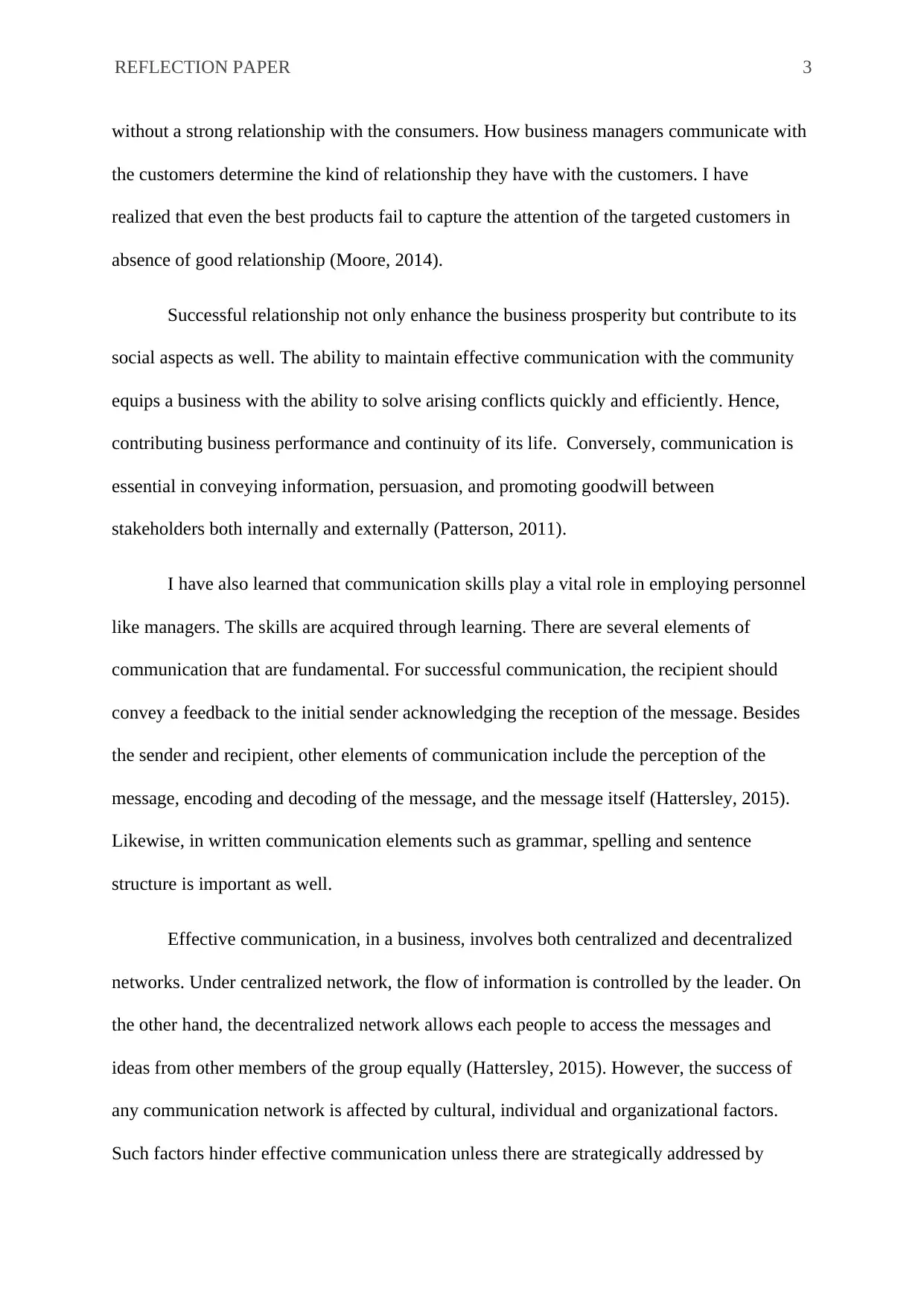
REFLECTION PAPER 3
without a strong relationship with the consumers. How business managers communicate with
the customers determine the kind of relationship they have with the customers. I have
realized that even the best products fail to capture the attention of the targeted customers in
absence of good relationship (Moore, 2014).
Successful relationship not only enhance the business prosperity but contribute to its
social aspects as well. The ability to maintain effective communication with the community
equips a business with the ability to solve arising conflicts quickly and efficiently. Hence,
contributing business performance and continuity of its life. Conversely, communication is
essential in conveying information, persuasion, and promoting goodwill between
stakeholders both internally and externally (Patterson, 2011).
I have also learned that communication skills play a vital role in employing personnel
like managers. The skills are acquired through learning. There are several elements of
communication that are fundamental. For successful communication, the recipient should
convey a feedback to the initial sender acknowledging the reception of the message. Besides
the sender and recipient, other elements of communication include the perception of the
message, encoding and decoding of the message, and the message itself (Hattersley, 2015).
Likewise, in written communication elements such as grammar, spelling and sentence
structure is important as well.
Effective communication, in a business, involves both centralized and decentralized
networks. Under centralized network, the flow of information is controlled by the leader. On
the other hand, the decentralized network allows each people to access the messages and
ideas from other members of the group equally (Hattersley, 2015). However, the success of
any communication network is affected by cultural, individual and organizational factors.
Such factors hinder effective communication unless there are strategically addressed by
without a strong relationship with the consumers. How business managers communicate with
the customers determine the kind of relationship they have with the customers. I have
realized that even the best products fail to capture the attention of the targeted customers in
absence of good relationship (Moore, 2014).
Successful relationship not only enhance the business prosperity but contribute to its
social aspects as well. The ability to maintain effective communication with the community
equips a business with the ability to solve arising conflicts quickly and efficiently. Hence,
contributing business performance and continuity of its life. Conversely, communication is
essential in conveying information, persuasion, and promoting goodwill between
stakeholders both internally and externally (Patterson, 2011).
I have also learned that communication skills play a vital role in employing personnel
like managers. The skills are acquired through learning. There are several elements of
communication that are fundamental. For successful communication, the recipient should
convey a feedback to the initial sender acknowledging the reception of the message. Besides
the sender and recipient, other elements of communication include the perception of the
message, encoding and decoding of the message, and the message itself (Hattersley, 2015).
Likewise, in written communication elements such as grammar, spelling and sentence
structure is important as well.
Effective communication, in a business, involves both centralized and decentralized
networks. Under centralized network, the flow of information is controlled by the leader. On
the other hand, the decentralized network allows each people to access the messages and
ideas from other members of the group equally (Hattersley, 2015). However, the success of
any communication network is affected by cultural, individual and organizational factors.
Such factors hinder effective communication unless there are strategically addressed by
⊘ This is a preview!⊘
Do you want full access?
Subscribe today to unlock all pages.

Trusted by 1+ million students worldwide
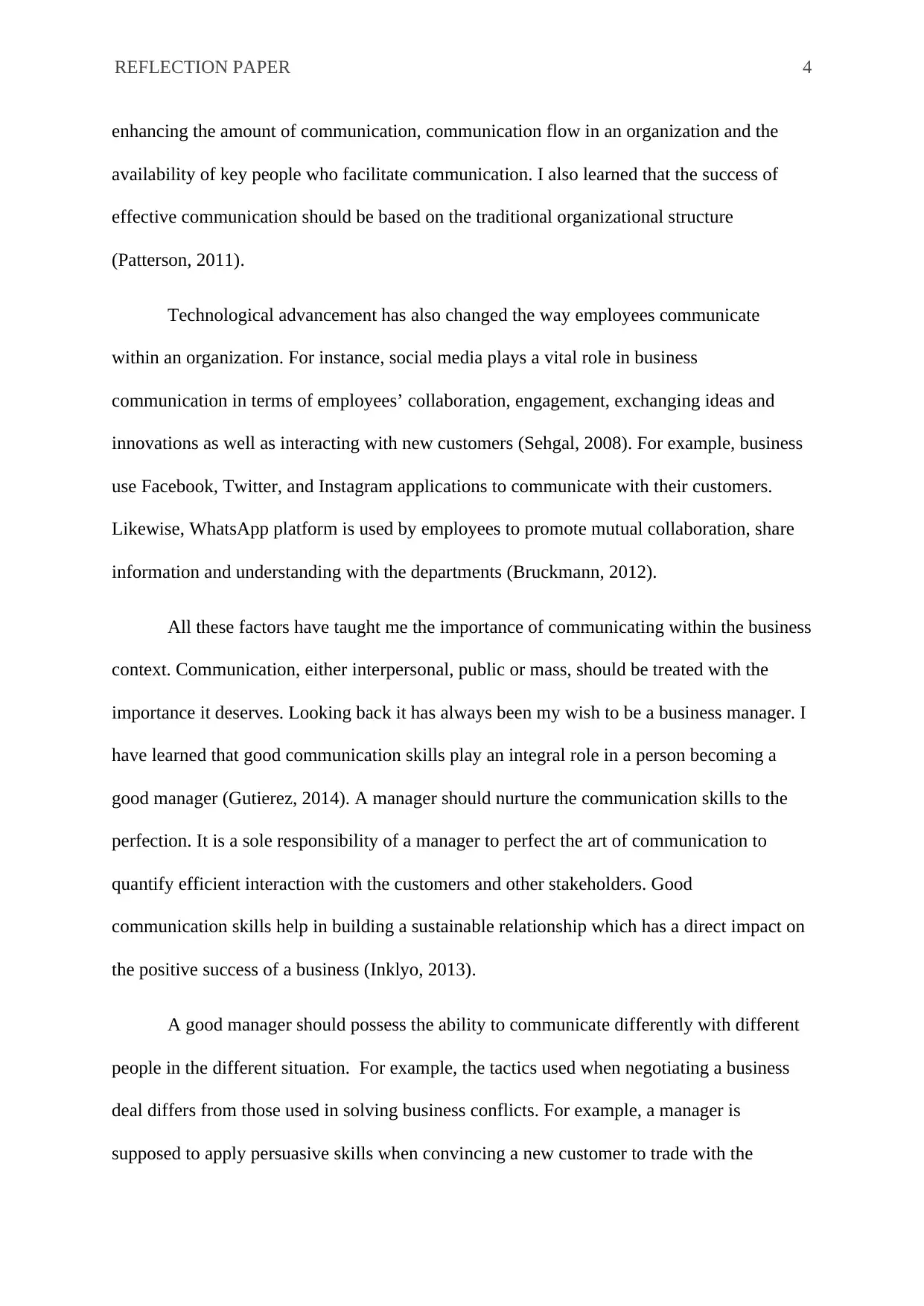
REFLECTION PAPER 4
enhancing the amount of communication, communication flow in an organization and the
availability of key people who facilitate communication. I also learned that the success of
effective communication should be based on the traditional organizational structure
(Patterson, 2011).
Technological advancement has also changed the way employees communicate
within an organization. For instance, social media plays a vital role in business
communication in terms of employees’ collaboration, engagement, exchanging ideas and
innovations as well as interacting with new customers (Sehgal, 2008). For example, business
use Facebook, Twitter, and Instagram applications to communicate with their customers.
Likewise, WhatsApp platform is used by employees to promote mutual collaboration, share
information and understanding with the departments (Bruckmann, 2012).
All these factors have taught me the importance of communicating within the business
context. Communication, either interpersonal, public or mass, should be treated with the
importance it deserves. Looking back it has always been my wish to be a business manager. I
have learned that good communication skills play an integral role in a person becoming a
good manager (Gutierez, 2014). A manager should nurture the communication skills to the
perfection. It is a sole responsibility of a manager to perfect the art of communication to
quantify efficient interaction with the customers and other stakeholders. Good
communication skills help in building a sustainable relationship which has a direct impact on
the positive success of a business (Inklyo, 2013).
A good manager should possess the ability to communicate differently with different
people in the different situation. For example, the tactics used when negotiating a business
deal differs from those used in solving business conflicts. For example, a manager is
supposed to apply persuasive skills when convincing a new customer to trade with the
enhancing the amount of communication, communication flow in an organization and the
availability of key people who facilitate communication. I also learned that the success of
effective communication should be based on the traditional organizational structure
(Patterson, 2011).
Technological advancement has also changed the way employees communicate
within an organization. For instance, social media plays a vital role in business
communication in terms of employees’ collaboration, engagement, exchanging ideas and
innovations as well as interacting with new customers (Sehgal, 2008). For example, business
use Facebook, Twitter, and Instagram applications to communicate with their customers.
Likewise, WhatsApp platform is used by employees to promote mutual collaboration, share
information and understanding with the departments (Bruckmann, 2012).
All these factors have taught me the importance of communicating within the business
context. Communication, either interpersonal, public or mass, should be treated with the
importance it deserves. Looking back it has always been my wish to be a business manager. I
have learned that good communication skills play an integral role in a person becoming a
good manager (Gutierez, 2014). A manager should nurture the communication skills to the
perfection. It is a sole responsibility of a manager to perfect the art of communication to
quantify efficient interaction with the customers and other stakeholders. Good
communication skills help in building a sustainable relationship which has a direct impact on
the positive success of a business (Inklyo, 2013).
A good manager should possess the ability to communicate differently with different
people in the different situation. For example, the tactics used when negotiating a business
deal differs from those used in solving business conflicts. For example, a manager is
supposed to apply persuasive skills when convincing a new customer to trade with the
Paraphrase This Document
Need a fresh take? Get an instant paraphrase of this document with our AI Paraphraser
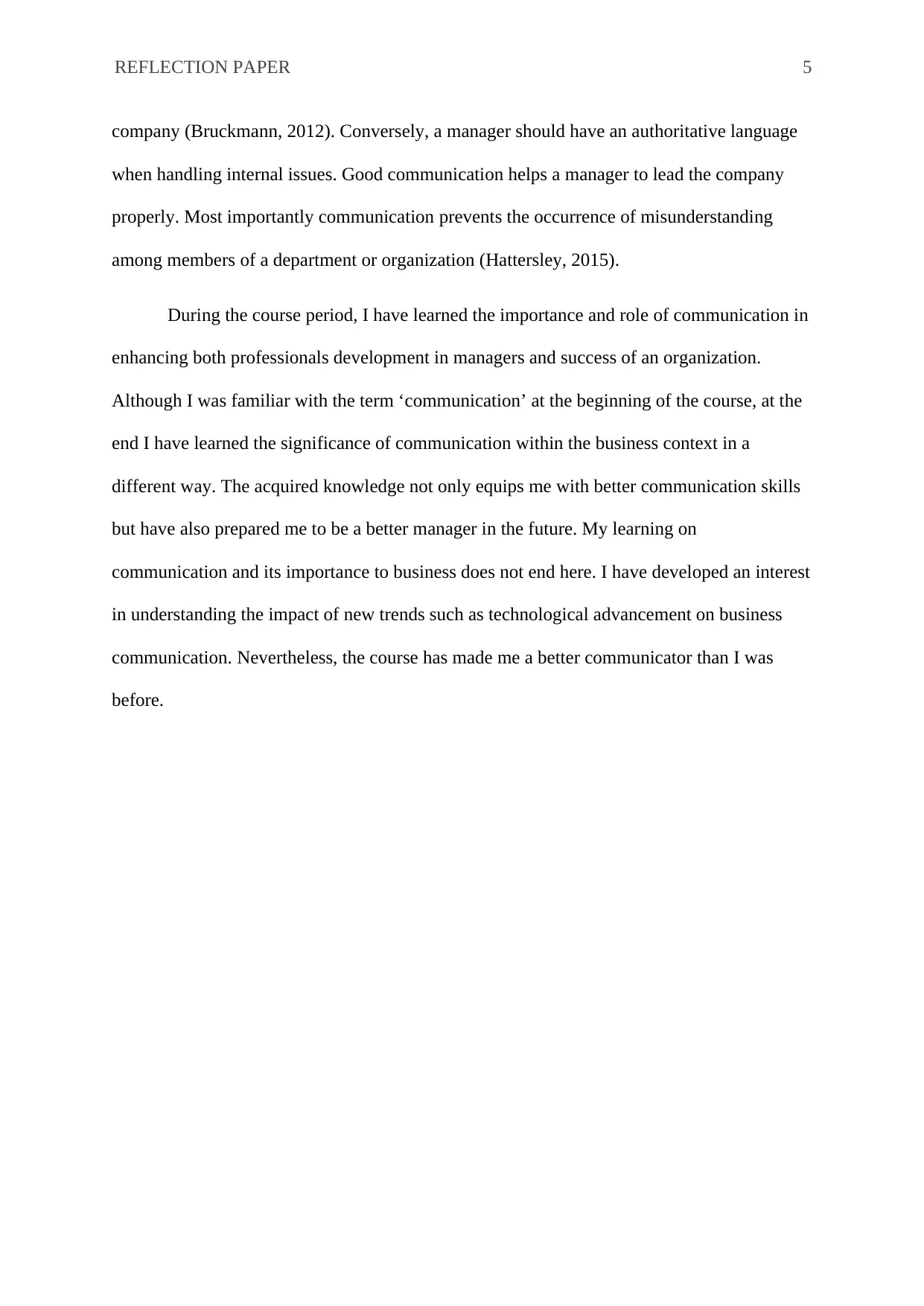
REFLECTION PAPER 5
company (Bruckmann, 2012). Conversely, a manager should have an authoritative language
when handling internal issues. Good communication helps a manager to lead the company
properly. Most importantly communication prevents the occurrence of misunderstanding
among members of a department or organization (Hattersley, 2015).
During the course period, I have learned the importance and role of communication in
enhancing both professionals development in managers and success of an organization.
Although I was familiar with the term ‘communication’ at the beginning of the course, at the
end I have learned the significance of communication within the business context in a
different way. The acquired knowledge not only equips me with better communication skills
but have also prepared me to be a better manager in the future. My learning on
communication and its importance to business does not end here. I have developed an interest
in understanding the impact of new trends such as technological advancement on business
communication. Nevertheless, the course has made me a better communicator than I was
before.
company (Bruckmann, 2012). Conversely, a manager should have an authoritative language
when handling internal issues. Good communication helps a manager to lead the company
properly. Most importantly communication prevents the occurrence of misunderstanding
among members of a department or organization (Hattersley, 2015).
During the course period, I have learned the importance and role of communication in
enhancing both professionals development in managers and success of an organization.
Although I was familiar with the term ‘communication’ at the beginning of the course, at the
end I have learned the significance of communication within the business context in a
different way. The acquired knowledge not only equips me with better communication skills
but have also prepared me to be a better manager in the future. My learning on
communication and its importance to business does not end here. I have developed an interest
in understanding the impact of new trends such as technological advancement on business
communication. Nevertheless, the course has made me a better communicator than I was
before.
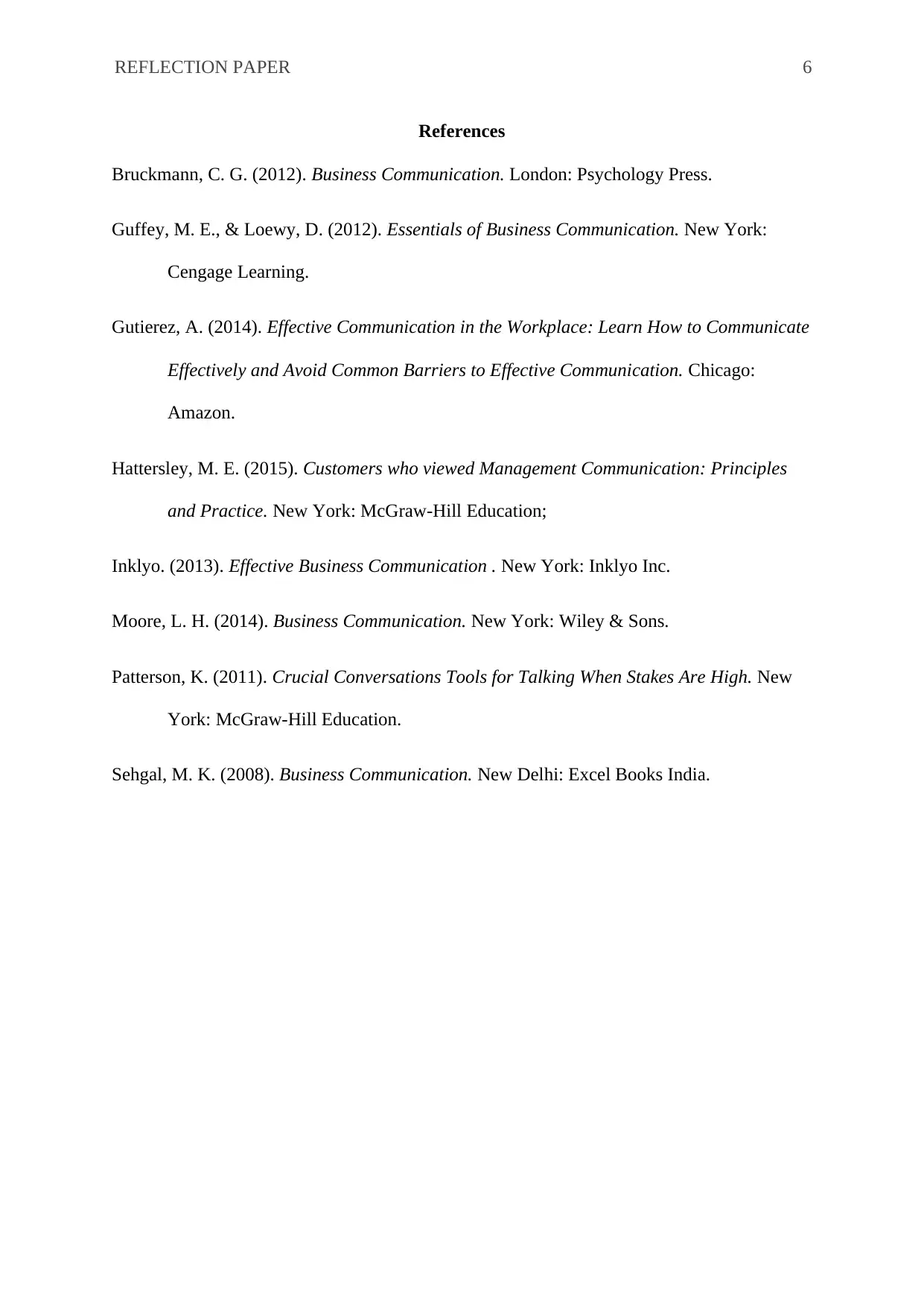
REFLECTION PAPER 6
References
Bruckmann, C. G. (2012). Business Communication. London: Psychology Press.
Guffey, M. E., & Loewy, D. (2012). Essentials of Business Communication. New York:
Cengage Learning.
Gutierez, A. (2014). Effective Communication in the Workplace: Learn How to Communicate
Effectively and Avoid Common Barriers to Effective Communication. Chicago:
Amazon.
Hattersley, M. E. (2015). Customers who viewed Management Communication: Principles
and Practice. New York: McGraw-Hill Education;
Inklyo. (2013). Effective Business Communication . New York: Inklyo Inc.
Moore, L. H. (2014). Business Communication. New York: Wiley & Sons.
Patterson, K. (2011). Crucial Conversations Tools for Talking When Stakes Are High. New
York: McGraw-Hill Education.
Sehgal, M. K. (2008). Business Communication. New Delhi: Excel Books India.
References
Bruckmann, C. G. (2012). Business Communication. London: Psychology Press.
Guffey, M. E., & Loewy, D. (2012). Essentials of Business Communication. New York:
Cengage Learning.
Gutierez, A. (2014). Effective Communication in the Workplace: Learn How to Communicate
Effectively and Avoid Common Barriers to Effective Communication. Chicago:
Amazon.
Hattersley, M. E. (2015). Customers who viewed Management Communication: Principles
and Practice. New York: McGraw-Hill Education;
Inklyo. (2013). Effective Business Communication . New York: Inklyo Inc.
Moore, L. H. (2014). Business Communication. New York: Wiley & Sons.
Patterson, K. (2011). Crucial Conversations Tools for Talking When Stakes Are High. New
York: McGraw-Hill Education.
Sehgal, M. K. (2008). Business Communication. New Delhi: Excel Books India.
⊘ This is a preview!⊘
Do you want full access?
Subscribe today to unlock all pages.

Trusted by 1+ million students worldwide
1 out of 6
Related Documents
Your All-in-One AI-Powered Toolkit for Academic Success.
+13062052269
info@desklib.com
Available 24*7 on WhatsApp / Email
![[object Object]](/_next/static/media/star-bottom.7253800d.svg)
Unlock your academic potential
Copyright © 2020–2026 A2Z Services. All Rights Reserved. Developed and managed by ZUCOL.



